ICT Project Management: Methodologies and Life Cycle
VerifiedAdded on 2021/04/17
|6
|1319
|145
Report
AI Summary
This report delves into the realm of ICT project management, providing a comprehensive overview of project methodologies. It begins with definitions of project methodology, emphasizing its role in initiating, planning, developing, executing, and delivering projects efficiently. The report then provides a detailed comparison between two prominent methodologies: PMBOK and PRINCE2. The comparison highlights their differing approaches, origins, and focus areas, including the roles of project managers and team members, and the certification processes. Furthermore, the report examines the similarities between the methodologies, particularly in their emphasis on risk management and the delivery of high-quality products to meet customer requirements. The report also explores the relationship between PRINCE2 and the Project Life Cycle (PLC), outlining the seven stages involved, from project initiation to closure, and how PRINCE2 aligns with each stage. References to relevant sources are included to support the analysis.
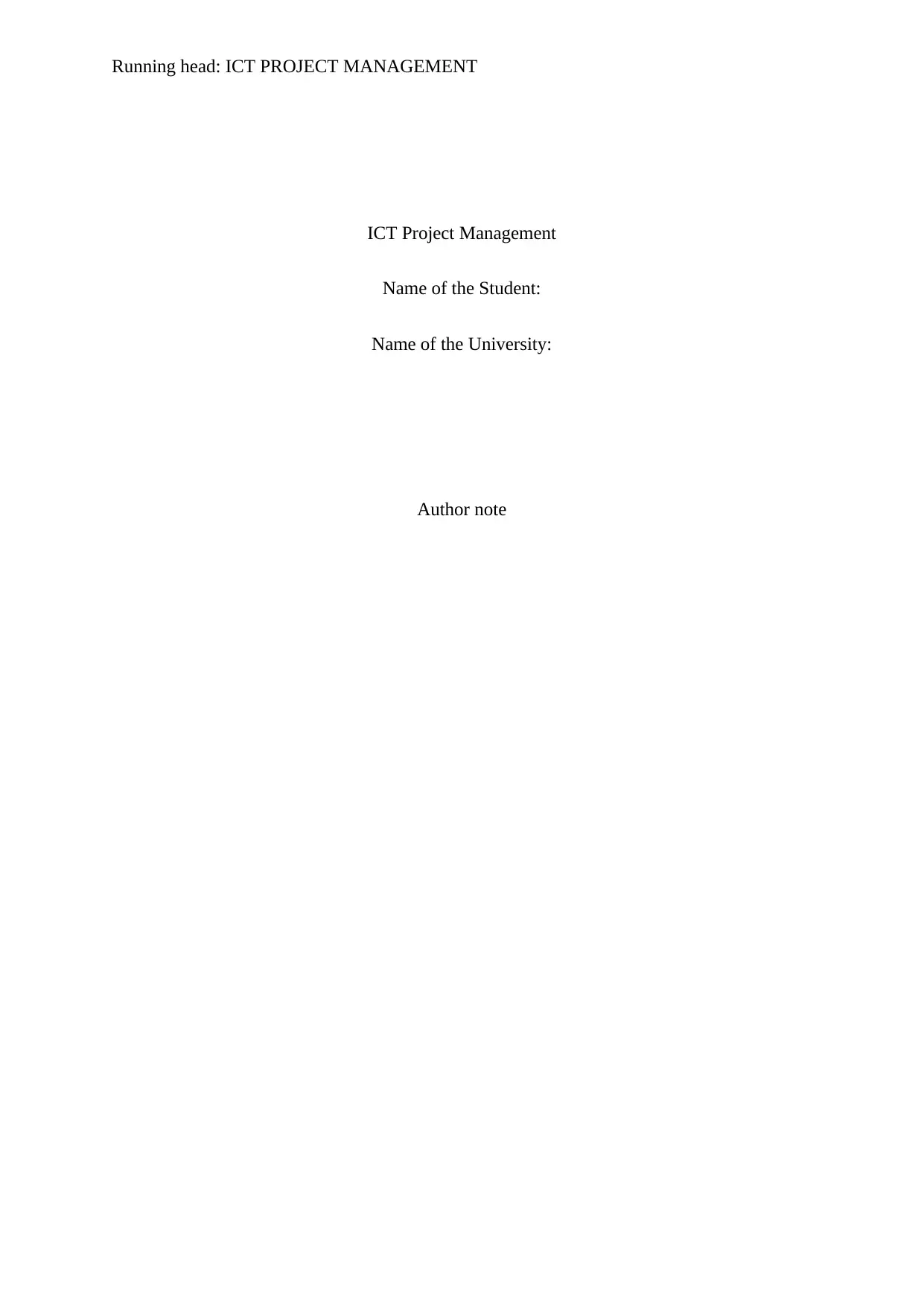
Running head: ICT PROJECT MANAGEMENT
ICT Project Management
Name of the Student:
Name of the University:
Author note
ICT Project Management
Name of the Student:
Name of the University:
Author note
Paraphrase This Document
Need a fresh take? Get an instant paraphrase of this document with our AI Paraphraser
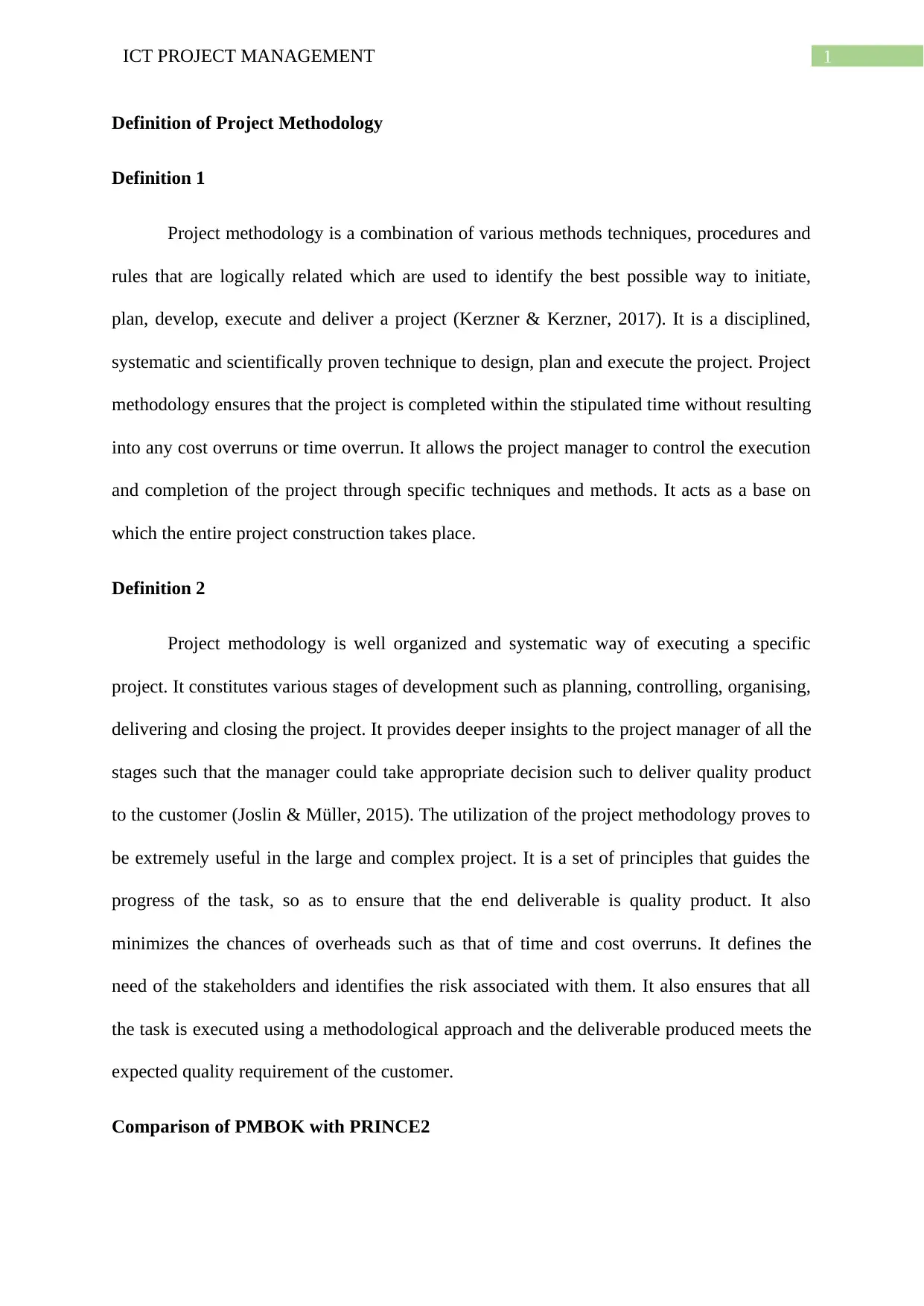
1ICT PROJECT MANAGEMENT
Definition of Project Methodology
Definition 1
Project methodology is a combination of various methods techniques, procedures and
rules that are logically related which are used to identify the best possible way to initiate,
plan, develop, execute and deliver a project (Kerzner & Kerzner, 2017). It is a disciplined,
systematic and scientifically proven technique to design, plan and execute the project. Project
methodology ensures that the project is completed within the stipulated time without resulting
into any cost overruns or time overrun. It allows the project manager to control the execution
and completion of the project through specific techniques and methods. It acts as a base on
which the entire project construction takes place.
Definition 2
Project methodology is well organized and systematic way of executing a specific
project. It constitutes various stages of development such as planning, controlling, organising,
delivering and closing the project. It provides deeper insights to the project manager of all the
stages such that the manager could take appropriate decision such to deliver quality product
to the customer (Joslin & Müller, 2015). The utilization of the project methodology proves to
be extremely useful in the large and complex project. It is a set of principles that guides the
progress of the task, so as to ensure that the end deliverable is quality product. It also
minimizes the chances of overheads such as that of time and cost overruns. It defines the
need of the stakeholders and identifies the risk associated with them. It also ensures that all
the task is executed using a methodological approach and the deliverable produced meets the
expected quality requirement of the customer.
Comparison of PMBOK with PRINCE2
Definition of Project Methodology
Definition 1
Project methodology is a combination of various methods techniques, procedures and
rules that are logically related which are used to identify the best possible way to initiate,
plan, develop, execute and deliver a project (Kerzner & Kerzner, 2017). It is a disciplined,
systematic and scientifically proven technique to design, plan and execute the project. Project
methodology ensures that the project is completed within the stipulated time without resulting
into any cost overruns or time overrun. It allows the project manager to control the execution
and completion of the project through specific techniques and methods. It acts as a base on
which the entire project construction takes place.
Definition 2
Project methodology is well organized and systematic way of executing a specific
project. It constitutes various stages of development such as planning, controlling, organising,
delivering and closing the project. It provides deeper insights to the project manager of all the
stages such that the manager could take appropriate decision such to deliver quality product
to the customer (Joslin & Müller, 2015). The utilization of the project methodology proves to
be extremely useful in the large and complex project. It is a set of principles that guides the
progress of the task, so as to ensure that the end deliverable is quality product. It also
minimizes the chances of overheads such as that of time and cost overruns. It defines the
need of the stakeholders and identifies the risk associated with them. It also ensures that all
the task is executed using a methodological approach and the deliverable produced meets the
expected quality requirement of the customer.
Comparison of PMBOK with PRINCE2
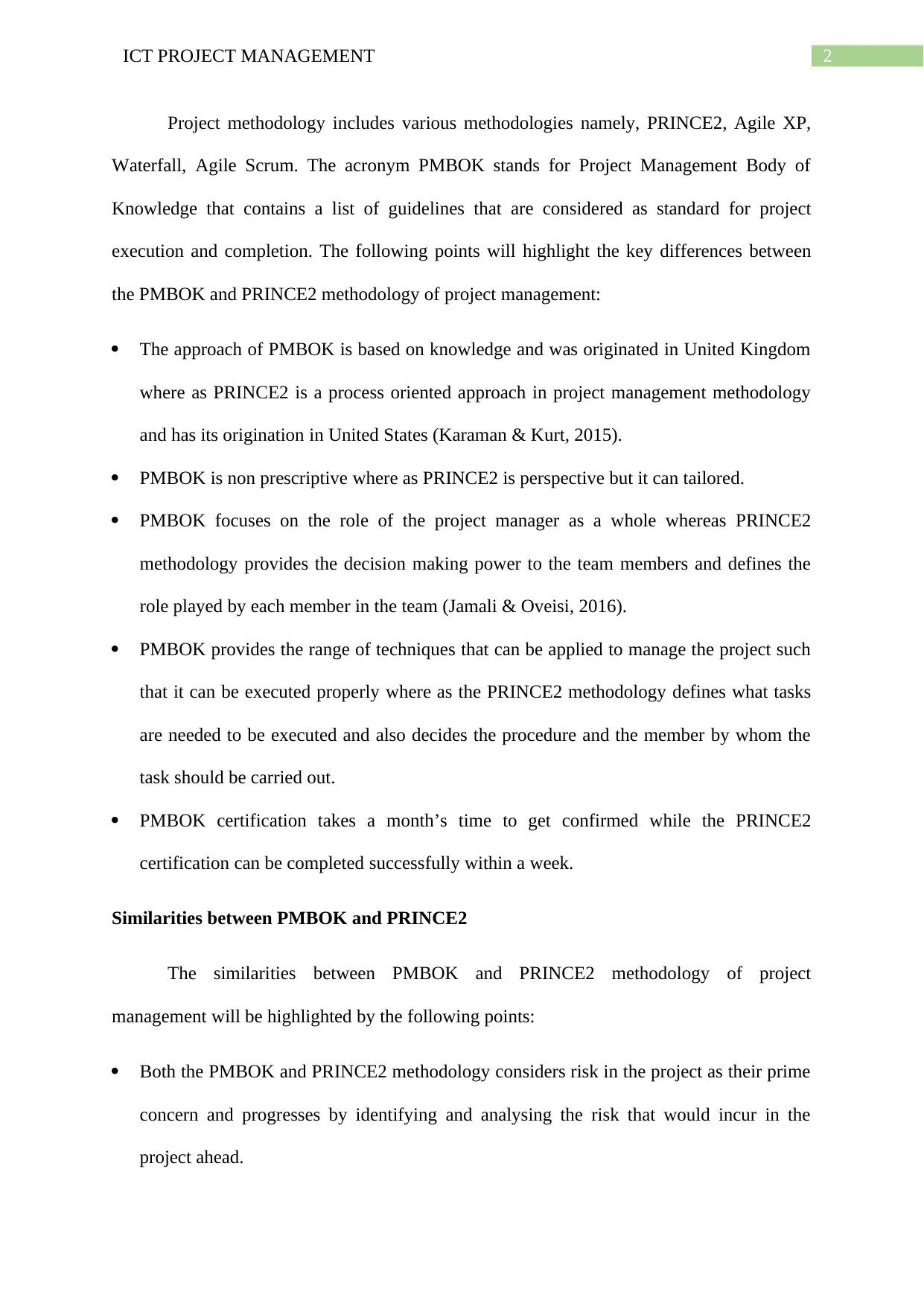
2ICT PROJECT MANAGEMENT
Project methodology includes various methodologies namely, PRINCE2, Agile XP,
Waterfall, Agile Scrum. The acronym PMBOK stands for Project Management Body of
Knowledge that contains a list of guidelines that are considered as standard for project
execution and completion. The following points will highlight the key differences between
the PMBOK and PRINCE2 methodology of project management:
The approach of PMBOK is based on knowledge and was originated in United Kingdom
where as PRINCE2 is a process oriented approach in project management methodology
and has its origination in United States (Karaman & Kurt, 2015).
PMBOK is non prescriptive where as PRINCE2 is perspective but it can tailored.
PMBOK focuses on the role of the project manager as a whole whereas PRINCE2
methodology provides the decision making power to the team members and defines the
role played by each member in the team (Jamali & Oveisi, 2016).
PMBOK provides the range of techniques that can be applied to manage the project such
that it can be executed properly where as the PRINCE2 methodology defines what tasks
are needed to be executed and also decides the procedure and the member by whom the
task should be carried out.
PMBOK certification takes a month’s time to get confirmed while the PRINCE2
certification can be completed successfully within a week.
Similarities between PMBOK and PRINCE2
The similarities between PMBOK and PRINCE2 methodology of project
management will be highlighted by the following points:
Both the PMBOK and PRINCE2 methodology considers risk in the project as their prime
concern and progresses by identifying and analysing the risk that would incur in the
project ahead.
Project methodology includes various methodologies namely, PRINCE2, Agile XP,
Waterfall, Agile Scrum. The acronym PMBOK stands for Project Management Body of
Knowledge that contains a list of guidelines that are considered as standard for project
execution and completion. The following points will highlight the key differences between
the PMBOK and PRINCE2 methodology of project management:
The approach of PMBOK is based on knowledge and was originated in United Kingdom
where as PRINCE2 is a process oriented approach in project management methodology
and has its origination in United States (Karaman & Kurt, 2015).
PMBOK is non prescriptive where as PRINCE2 is perspective but it can tailored.
PMBOK focuses on the role of the project manager as a whole whereas PRINCE2
methodology provides the decision making power to the team members and defines the
role played by each member in the team (Jamali & Oveisi, 2016).
PMBOK provides the range of techniques that can be applied to manage the project such
that it can be executed properly where as the PRINCE2 methodology defines what tasks
are needed to be executed and also decides the procedure and the member by whom the
task should be carried out.
PMBOK certification takes a month’s time to get confirmed while the PRINCE2
certification can be completed successfully within a week.
Similarities between PMBOK and PRINCE2
The similarities between PMBOK and PRINCE2 methodology of project
management will be highlighted by the following points:
Both the PMBOK and PRINCE2 methodology considers risk in the project as their prime
concern and progresses by identifying and analysing the risk that would incur in the
project ahead.
⊘ This is a preview!⊘
Do you want full access?
Subscribe today to unlock all pages.

Trusted by 1+ million students worldwide
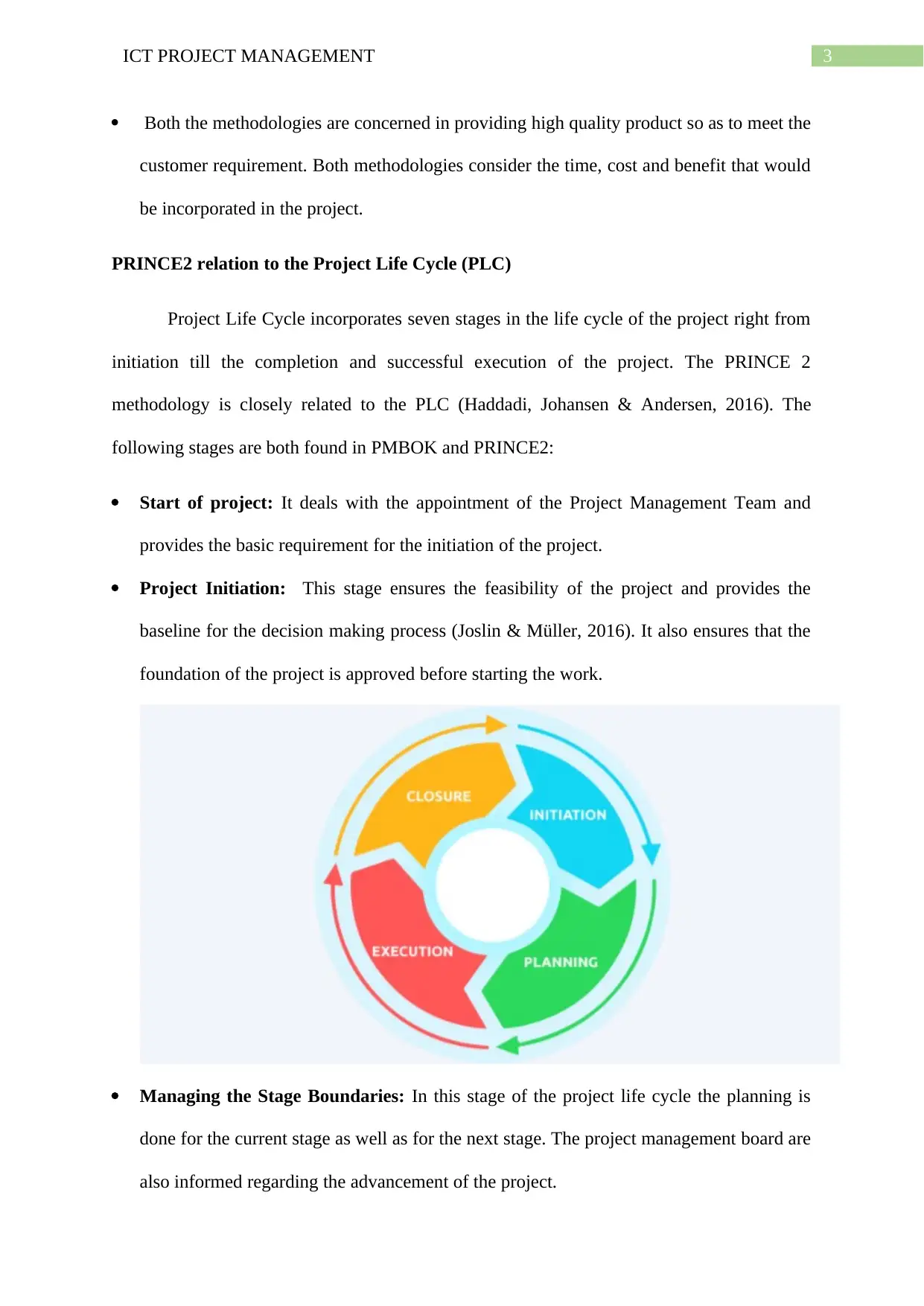
3ICT PROJECT MANAGEMENT
Both the methodologies are concerned in providing high quality product so as to meet the
customer requirement. Both methodologies consider the time, cost and benefit that would
be incorporated in the project.
PRINCE2 relation to the Project Life Cycle (PLC)
Project Life Cycle incorporates seven stages in the life cycle of the project right from
initiation till the completion and successful execution of the project. The PRINCE 2
methodology is closely related to the PLC (Haddadi, Johansen & Andersen, 2016). The
following stages are both found in PMBOK and PRINCE2:
Start of project: It deals with the appointment of the Project Management Team and
provides the basic requirement for the initiation of the project.
Project Initiation: This stage ensures the feasibility of the project and provides the
baseline for the decision making process (Joslin & Müller, 2016). It also ensures that the
foundation of the project is approved before starting the work.
Managing the Stage Boundaries: In this stage of the project life cycle the planning is
done for the current stage as well as for the next stage. The project management board are
also informed regarding the advancement of the project.
Both the methodologies are concerned in providing high quality product so as to meet the
customer requirement. Both methodologies consider the time, cost and benefit that would
be incorporated in the project.
PRINCE2 relation to the Project Life Cycle (PLC)
Project Life Cycle incorporates seven stages in the life cycle of the project right from
initiation till the completion and successful execution of the project. The PRINCE 2
methodology is closely related to the PLC (Haddadi, Johansen & Andersen, 2016). The
following stages are both found in PMBOK and PRINCE2:
Start of project: It deals with the appointment of the Project Management Team and
provides the basic requirement for the initiation of the project.
Project Initiation: This stage ensures the feasibility of the project and provides the
baseline for the decision making process (Joslin & Müller, 2016). It also ensures that the
foundation of the project is approved before starting the work.
Managing the Stage Boundaries: In this stage of the project life cycle the planning is
done for the current stage as well as for the next stage. The project management board are
also informed regarding the advancement of the project.
Paraphrase This Document
Need a fresh take? Get an instant paraphrase of this document with our AI Paraphraser
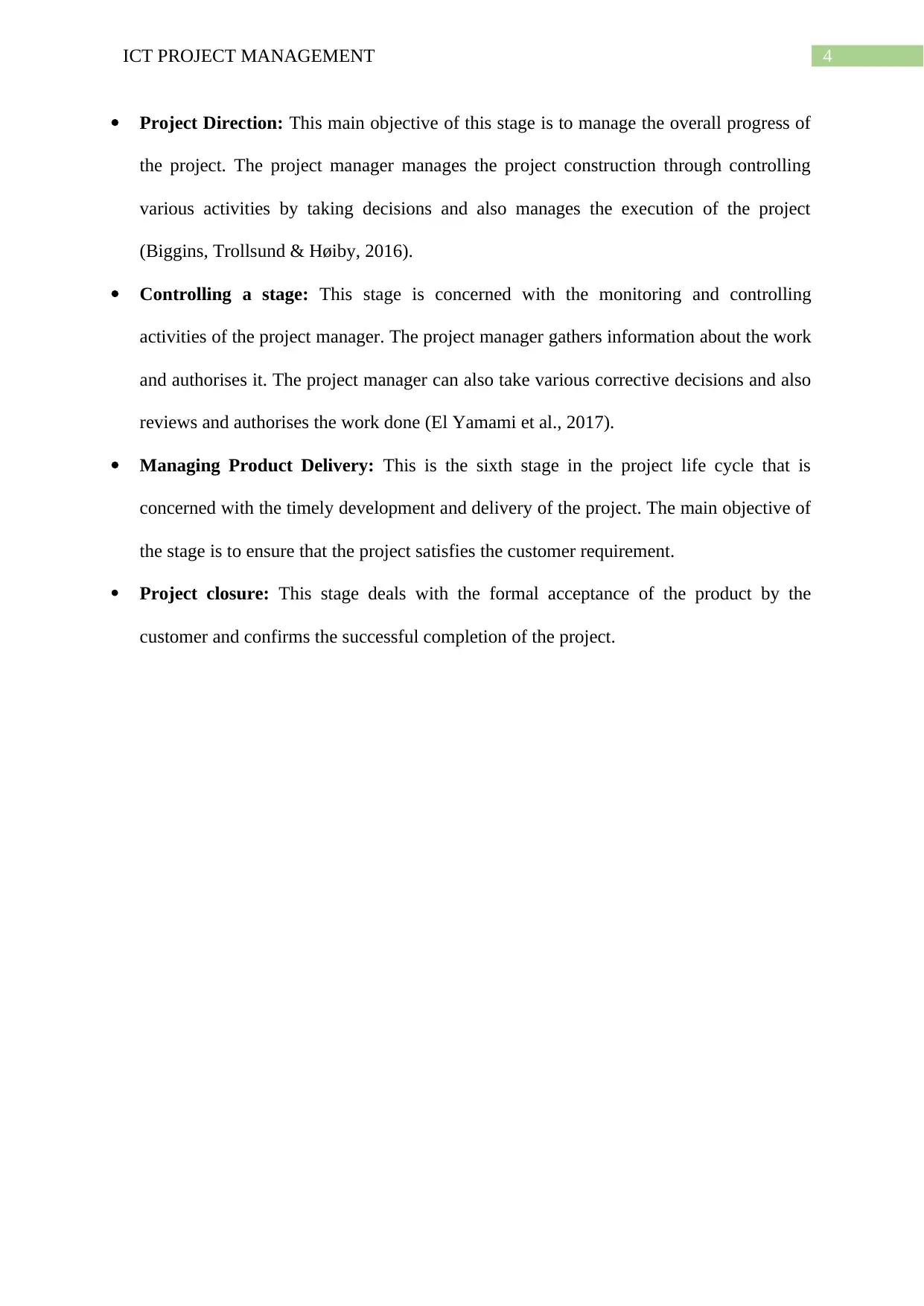
4ICT PROJECT MANAGEMENT
Project Direction: This main objective of this stage is to manage the overall progress of
the project. The project manager manages the project construction through controlling
various activities by taking decisions and also manages the execution of the project
(Biggins, Trollsund & Høiby, 2016).
Controlling a stage: This stage is concerned with the monitoring and controlling
activities of the project manager. The project manager gathers information about the work
and authorises it. The project manager can also take various corrective decisions and also
reviews and authorises the work done (El Yamami et al., 2017).
Managing Product Delivery: This is the sixth stage in the project life cycle that is
concerned with the timely development and delivery of the project. The main objective of
the stage is to ensure that the project satisfies the customer requirement.
Project closure: This stage deals with the formal acceptance of the product by the
customer and confirms the successful completion of the project.
Project Direction: This main objective of this stage is to manage the overall progress of
the project. The project manager manages the project construction through controlling
various activities by taking decisions and also manages the execution of the project
(Biggins, Trollsund & Høiby, 2016).
Controlling a stage: This stage is concerned with the monitoring and controlling
activities of the project manager. The project manager gathers information about the work
and authorises it. The project manager can also take various corrective decisions and also
reviews and authorises the work done (El Yamami et al., 2017).
Managing Product Delivery: This is the sixth stage in the project life cycle that is
concerned with the timely development and delivery of the project. The main objective of
the stage is to ensure that the project satisfies the customer requirement.
Project closure: This stage deals with the formal acceptance of the product by the
customer and confirms the successful completion of the project.
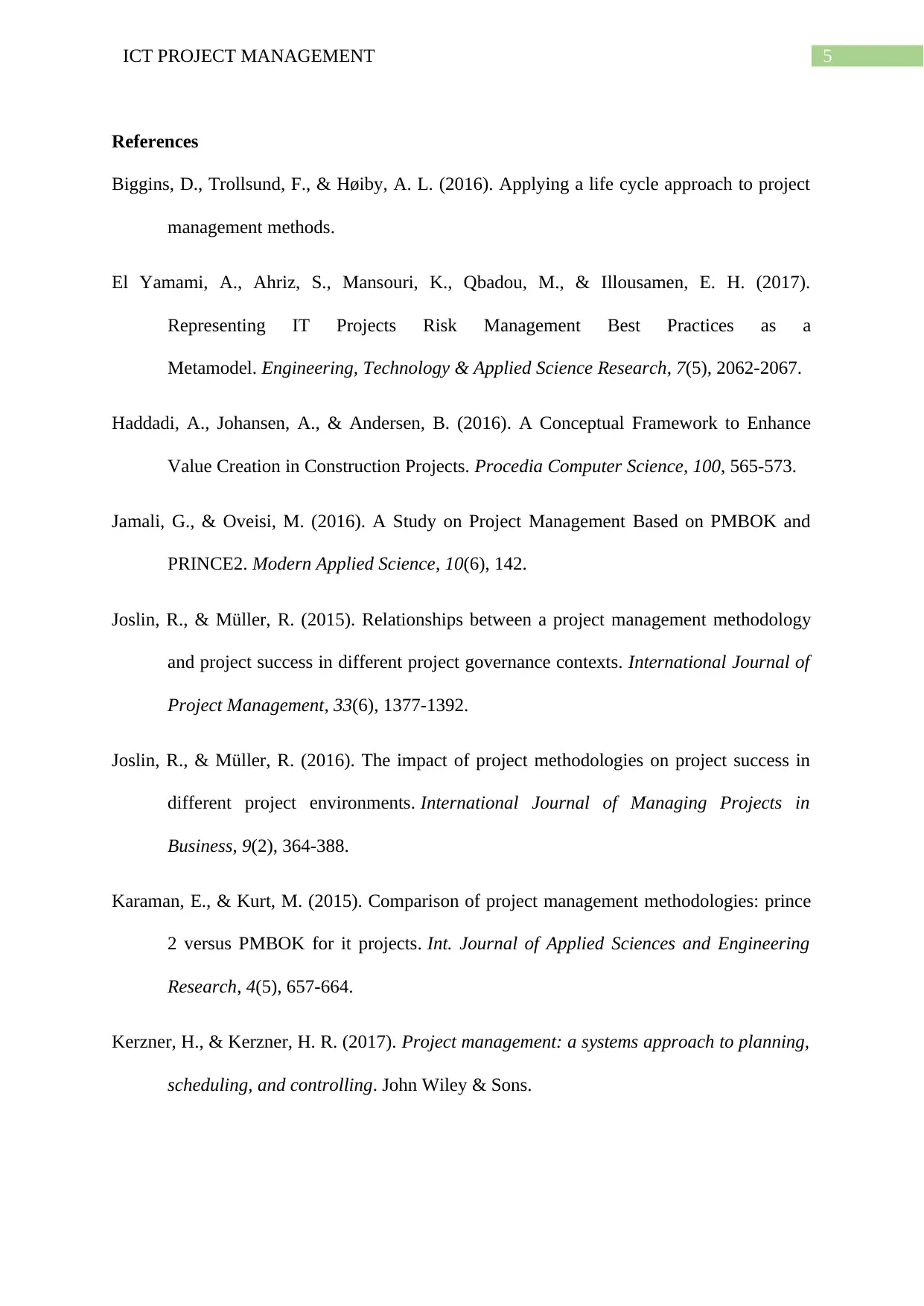
5ICT PROJECT MANAGEMENT
References
Biggins, D., Trollsund, F., & Høiby, A. L. (2016). Applying a life cycle approach to project
management methods.
El Yamami, A., Ahriz, S., Mansouri, K., Qbadou, M., & Illousamen, E. H. (2017).
Representing IT Projects Risk Management Best Practices as a
Metamodel. Engineering, Technology & Applied Science Research, 7(5), 2062-2067.
Haddadi, A., Johansen, A., & Andersen, B. (2016). A Conceptual Framework to Enhance
Value Creation in Construction Projects. Procedia Computer Science, 100, 565-573.
Jamali, G., & Oveisi, M. (2016). A Study on Project Management Based on PMBOK and
PRINCE2. Modern Applied Science, 10(6), 142.
Joslin, R., & Müller, R. (2015). Relationships between a project management methodology
and project success in different project governance contexts. International Journal of
Project Management, 33(6), 1377-1392.
Joslin, R., & Müller, R. (2016). The impact of project methodologies on project success in
different project environments. International Journal of Managing Projects in
Business, 9(2), 364-388.
Karaman, E., & Kurt, M. (2015). Comparison of project management methodologies: prince
2 versus PMBOK for it projects. Int. Journal of Applied Sciences and Engineering
Research, 4(5), 657-664.
Kerzner, H., & Kerzner, H. R. (2017). Project management: a systems approach to planning,
scheduling, and controlling. John Wiley & Sons.
References
Biggins, D., Trollsund, F., & Høiby, A. L. (2016). Applying a life cycle approach to project
management methods.
El Yamami, A., Ahriz, S., Mansouri, K., Qbadou, M., & Illousamen, E. H. (2017).
Representing IT Projects Risk Management Best Practices as a
Metamodel. Engineering, Technology & Applied Science Research, 7(5), 2062-2067.
Haddadi, A., Johansen, A., & Andersen, B. (2016). A Conceptual Framework to Enhance
Value Creation in Construction Projects. Procedia Computer Science, 100, 565-573.
Jamali, G., & Oveisi, M. (2016). A Study on Project Management Based on PMBOK and
PRINCE2. Modern Applied Science, 10(6), 142.
Joslin, R., & Müller, R. (2015). Relationships between a project management methodology
and project success in different project governance contexts. International Journal of
Project Management, 33(6), 1377-1392.
Joslin, R., & Müller, R. (2016). The impact of project methodologies on project success in
different project environments. International Journal of Managing Projects in
Business, 9(2), 364-388.
Karaman, E., & Kurt, M. (2015). Comparison of project management methodologies: prince
2 versus PMBOK for it projects. Int. Journal of Applied Sciences and Engineering
Research, 4(5), 657-664.
Kerzner, H., & Kerzner, H. R. (2017). Project management: a systems approach to planning,
scheduling, and controlling. John Wiley & Sons.
⊘ This is a preview!⊘
Do you want full access?
Subscribe today to unlock all pages.

Trusted by 1+ million students worldwide
1 out of 6
Related Documents
Your All-in-One AI-Powered Toolkit for Academic Success.
+13062052269
info@desklib.com
Available 24*7 on WhatsApp / Email
![[object Object]](/_next/static/media/star-bottom.7253800d.svg)
Unlock your academic potential
Copyright © 2020–2026 A2Z Services. All Rights Reserved. Developed and managed by ZUCOL.





